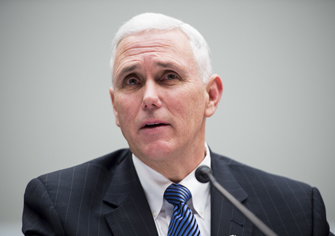Subscriber Benefit
As a subscriber you can listen to articles at work, in the car, or while you work out. Subscribe NowIndiana Gov. Mike Pence launched his re-election campaign Thursday night by taking a defiant stance against critics of the state's new religious objections law that battered his image as a national star among conservatives.
Pence told the crowd at a state Republican Party fundraising dinner that he doesn't tolerate discrimination against anyone—an attack he's faced from critics who maintain the law is anti-gay and led to a social media-driven storm of protests.
"Hoosiers also know that in the changing tides of popular culture there must be room for faith," Pence said. "We will find our way forward as a state that respects the dignity and worth of every individual, and we will ensure that no government intervention, no government coercion will interfere with the freedom of conscience and the freedom of religion."
The uproar over the law that Pence signed in March has given Democrats hope of ending a 12-year Republican hold on the state's top office.
The 56-year-old Pence championed social issues during 12 years in Congress but largely avoided them during his 2012 campaign and early in his governorship. He had been seen by in GOP circles as someone who could unite the party's religious and business wings, and stoked talk of a White House run with speeches to prominent conservative groups and trips overseas.
Those prospects faded when he signed the state's Religious Freedom Restoration Act, touching off national criticism including from prominent business leaders, entertainers and sports figures.
The Republican-dominated Legislature quickly revised the law to limit its use in sexual orientation matters. But the fallout prompted Indiana to hire a New York public relations firm to help rebuild its image.
A poll in April found Pence's approval rating at only 45 percent, and he's faced persistent criticism from both business officials and social conservatives for his handling of the issue.
Pence said in his speech that he bears some responsibility for the uproar, but that it was spurred by liberal special interests.
"If you can't tell already, this is going to be a fight and I'm ready," Pence said of his campaign for a second four-year term.
About 50 protesters waving signs with "Fire Mike Pence" and similar slogans lined a sidewalk outside the banquet hall before Pence's speech, at times shouting chants such as "No hate in our state."
Pence also touted how Indiana's unemployment rate has fallen by 3 percentage points to 5.4 percent since he took office and his advocacy for increased charter school funding and expansion of the state's private school voucher program.
Democrats, noting that Indiana's per capita income is 87 percent of the national average, said many people disagree with Pence's assessment of the state's economy and believe he caused the state lasting harm with the religious objections law.
"This is the kind of stain that doesn't leave," Indiana House Democratic leader Scott Pelath said. "They understand that he is willing to put the state's economic performance at risk in the service of a social agenda."
Pence begins the 2016 campaign with huge advantages in fundraising and organization over any potential rivals. His campaign ended last year with $3.5 million in the bank and is certain to show a large jump when updated reports are filed next month.
He doesn't yet face any competition for the Republican nomination, although two wealthy GOP businessmen have talked about launching or supporting challenges to him.
Three Democrats are seeking their party's nomination—state schools Superintendent Glenda Ritz, who has frequently clashed with Pence over education policy; former Indiana House Speaker John Gregg, who narrowly lost to Pence in the 2012 election, and state Sen. Karen Tallian of Portage.
The November 2016 election is so far away that there's no way of knowing whether the religious objections law will still resonate with voters, said Marjorie Hershey, an Indiana University political scientist.
Pence will have the money to run an advertising blitz on other issues in the weeks leading up to the election, she said.
"It sure helps candidates who have gotten in over their heads to be able to pull back—and the way they do that, generally, is by changing the subject," Hershey said.
Please enable JavaScript to view this content.

